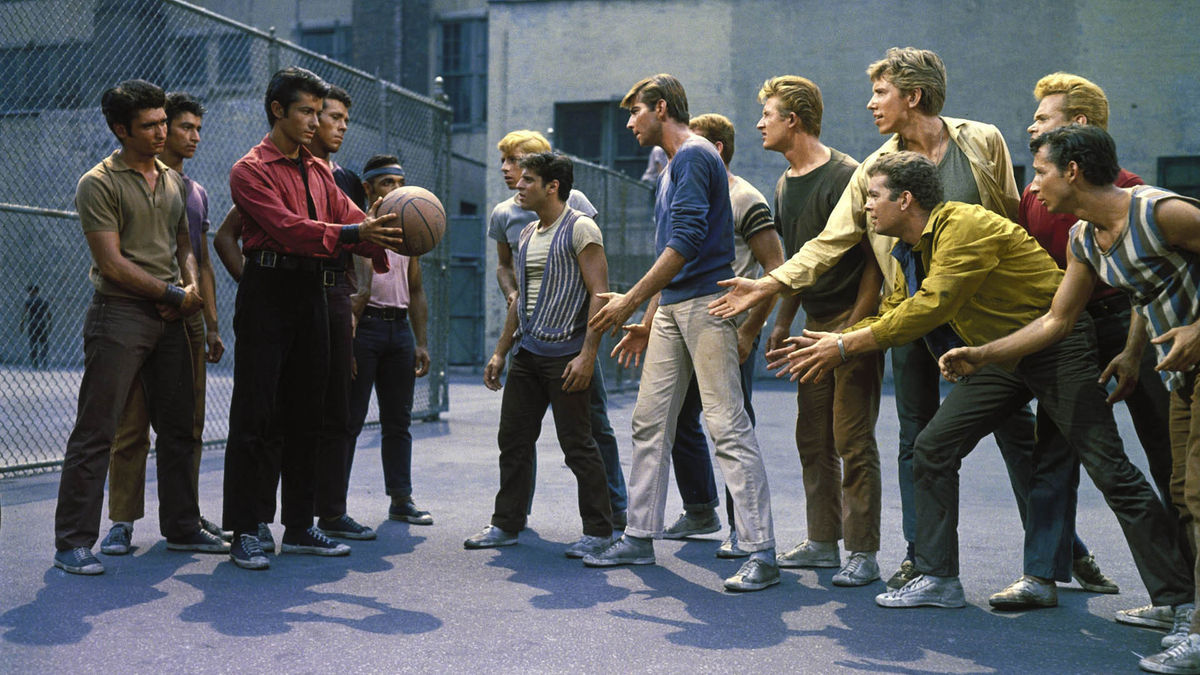The Jets, the Sharks, and a Trade Agreement
The following tale about trade, protectionism, and trade agreements is more realistic than it seems on the surface.
You live in Rolling Acres, a neighborhood controlled by the Sharks. Although a ruthless bunch, members of this gang aren’t stupid. They know that to retain their profitable control of Rolling Acres they need allies among your neighbors. The Sharks also know that the only reliable allies are those who share in the gains that the Sharks enjoy from their control of your neighborhood.
To procure the support of key neighbors the Sharks fan out across Rolling Acres to announce a new policy. As the switchblade-wielding Shark who arrived at your door puts it, “We ain’t no more gonna let you buy tomatoes from outside of this here neighborhood. And that means no more tomatoes from Oakmont – you know, that neighborhood where tomatoes sell for really low prices.”
Without another word, the Shark, peering menacingly into your eyes, touches the blade of his knife to your neck. The message is clear: you must stop buying tomatoes from outside of Rolling Acres.
Valuing your life more highly than tasty tomatoes, you now buy tomatoes only from vegetable farmer Jones who lives at the end of your street. Jones’s tomatoes aren’t as juicy as the ones from Oakmont. Adding injury to insult, not only is the price that Jones charges higher than the price charged for tomatoes in Oakmont, it’s higher than the price that Jones charged before the Sharks new tomato policy took effect. Still, if you want tomatoes, Jones is your only option.
Chit-chatting with Jones one morning as he bags some scrawny tomatoes that you bought from him, you learn that Jones is impressed with what he calls “the Sharks’ pragmatic and business-friendly policies.”
“Yessir,” Jones declares, “before the Sharks’ new tomato policy, my sales and profits were much lower than they are now. I also couldn’t afford to employ as many workers as I do today. But now, my business is growing. I’m a loyal supporter of the Sharks!”
As you walk home you notice that the neighborhood nail salon has gone out of business. You’re curious as to why, especially in light of the Sharks’ pro-business policies.
When you get home your wife asks if you heard about what just happened in Oakmont. She informs you that a rival gang, the Jets, have seized control of that neighborhood and that they’re ruling Oakmont in pretty much the same ways that the Sharks rule Rolling Acres. “I hope that war doesn’t break out between the Jets and our Sharks,” you reply to your wife.
Fortunately, no actual war breaks out. In fact, the Sharks and the Jets announce that they’re cooperating with each other to improve the lives of the citizens of their respective neighborhoods. You learn from tomato-farmer Jones that the Sharks – being great champions of business – have reached a milestone agreement amongst themselves to improve his business even further.
Jones giddily explains: “The Sharks, you see, got the Jets to let the people in Oakmont buy my tomatoes. With me now selling tomatoes in Rolling Acres and in Oakmont, my business will boom even more! The Sharks are great!”
When you ask Jones just how the Sharks achieved this happy result, he replies that, unfortunately, it came at a cost. “You know how the Sharks have long promised to slit the throats of people in our neighborhood who buy apples from those excellent apple growers in Oakmont?” You reply in the affirmative, telling Jones that the Sharks’ apple policy – being identical to the Sharks’ tomato policy – increased the business of apple growers in Rolling Acres.
“That’s right,” says Jones. “But the Jets – unfair traders that they are! – refused to let Oakmonters buy more tomatoes from me unless the Sharks let us in Rolling Acres buy more apples from Oakmont. So to improve my business, the Sharks made the concession to let us buy more apples from Oakmont. I feel bad for our apple growers, but, hey, business is business. This new trade deal will be really good for me and my workers!”
And sure enough, ORATA – “Oakmont Rolling Acres Trade Agreement” – genuinely made the lives of the people of the two neighborhoods better than they were before that agreement was signed. Trade between Rolling Acres and Oakmont became freer. Of course, this trade isn’t completely free; far from it. Both the Sharks and the Jets still prevent the peoples of their respective neighborhoods from buying lots of things from outsiders. But this trade is more free than it was before ORATA.
A Weirdo Arrives … and Departs
Many years after ORATA went into effect, a mysterious and sharp-witted woman by the name of Frederica Bastable arrived in Rolling Acres. Ms. Bastable immediately started asking every citizen who would listen a series of annoying questions, such as:
– “Why do you tolerate the Sharks’ continuing threats to slit your throat if you buy stuff from outside of Rolling Acres on terms that they disapprove of? Aren’t you – as the person who earned the income that you’re spending – the only person who should get to approve or disapprove of how that income is spent? What right have the Sharks to obstruct your peaceful trade?”
– “Why do the Sharks call it a “concession” to the Jets whenever the Sharks allow you greater freedom to buy goods and services from the people of Oakmont? Do you think that the people who principally benefit when your rulers lessen their obstruction of your freedom to trade are the outsiders who then sell you more stuff? And when you become more free to trade with outsiders, do you feel that you are thereby weighed down with a heavier burden – or do you feel that the burden that you bear to provide for yourself and your family has been lightened?”
– “Who is this tomato-farmer Jones that his economic well-being is more important than your own? Does the higher income that Jones rakes in only as a consequence of the Sharks’ obstruction of your freedom to trade morally justify the Sharks’ promise to slit your throats if you buy tomatoes from outside of Rolling Acres? And how does Jones’s higher income compensate you and others in Rolling Acres whose spending power falls as a result of the Sharks’ successful effort to make Jones’s spending power rise?”
– “Why don’t you all, as a People, just courageously refuse to let the Sharks obstruct your freedom to trade with whomever you wish and on whatever peaceful terms you wish?”
Alas, Ms. Bastable was dismissed by nearly every resident of Rolling Acres as either a nut-case or an unrealistic ideologue. She was soon run out of the neighborhood. And no one was more pleased and relieved to see her go than was Jones.











